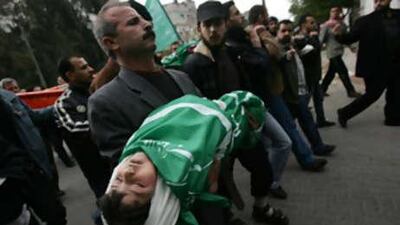GAZA CITY // Palestinian civilian deaths mounted yesterday as Israeli forces continued to bombard targets around the Gaza Strip in the third day of an operation widely considered to be the most aggressive assault on the Palestinian population in decades.
At least 325 people have been killed and more than 1,400 wounded in a series of air strikes that began at noon on Saturday as Israeli air and sea forces sought to dismantle the Islamist group Hamas, which effectively controls the Gaza Strip. The Israeli military said they were bombing militant-related targets. But of the Gazans who have died so far, at least 57 were civilians, including about 20 children, said Christopher Gunness, a spokesman for the UN Palestinian refugee agency, UNRWA. Mr Gunness said five girls from the same family, ages four to 17, were killed by an air raid on Sunday night that targeted a mosque near their home in the northern town of Jabalya.
Mahmoud Abbas, the Palestinian president, called the assaults on his enemies in Hamas a "sweeping Israeli aggression against Gaza". The scenes inside Gaza's hospitals, which had already been beleaguered by an embargo that limited medical aid over the past year, have turned even more dour, witnesses said. Al Shifa Hosptial, the main facility in Gaza City, has been completely overwhelmed by the number of dead and wounded. The parking spaces and pavements have been turned into makeshift morgues as desperate families search through the piles of dead in an effort to identify family members.
The wounded filled every part of the hospital and as supplies and medicine were running out. An air strike in the Khan Yunis refugee camp apparently targeted two senior members of Islamic Jihad, who were killed along with five other civilians, witnesses said. Among the dead was a boy about 10. In another strike that appeared to target the home of Maher Zaqou, a commander of the Hamas military wing in the border town of Beit Laylah, an additional eight people were killed and 20 injured in the collapsed house, but Hamas officials said Mr Zaqou was not inside at the time of the strike.
Hamas officials told Arab news stations who have reporters in Gaza that at least 180 members of their security forces have been killed in the past three days. Many of the civilian casualties appear to have occurred in homes with proximity to Hamas police stations or other official targets. Meanwhile several dozen rockets were launched by Hamas into Israel yesterday, representing a significant drop from the more than 200 fired on Saturday after the Israeli air force began its air strikes.
Israeli officials warned the operation might expand to include major ground incursions to destroy Hamas infrastructure and prevent militants from firing rockets into southern Israel. Witnesses close to the outskirts of the Gaza Strip yesterday reported huge amounts of military equipment being moved closer to the border, apparently in anticipation of a ground assault, with tanks and armoured vehicles being trucked into the area. Israeli officials also authorised the activation of at least 6,000 reservists to the military as part of their bolstered military presence. Although the Israeli air strikes have devastated much of Hamas's overt capabilities - targets yesterday included main security buildings and homes of known militant leaders - the attacks have not deterred the various militant groups from continuing to fire homemade rockets over the fence into nearby towns. Andy David, a spokesman for Israel's interior ministry, said at least two dozen rockets landed in nearby towns in a series of about 10 separate attacks yesterday, with at least one person killed and several wounded in one strike that hit the major Israeli city of Ashqelon, about 25 kilometres from the heavily guarded border with Gaza. In the past, few of the homemade rockets have shown such a range, leaving Israeli officials vowing to continue the operation until all rocket fire ceases. "In most of the attacks, the damage is only anxiety-type of injuries, with people terrified in the homes and shelters," Mr David said. "But we have confirmed reports that one person was killed." Local television stations reported the dead man was a Palestinian citizen of Israel. Under growing pressure from both its allies and enemies to limit damage to the civilian population, Israel yesterday allowed at least 20 lorries filled with food and medicine from the World Food Programme through a crossing point, but it has denied journalists entry to the area, and denied wounded Palestinians seeking to leave medical treatment. On the Egyptian side of the border, which adjoins the Rafah refugee camp in southern Gaza, the Egyptian government yesterday began to allow some aid convoys and the evacuation of some wounded through its crossings. On Sunday, Egyptian security forces clashed with Hamas gunmen when the Egyptians refused to allow people to flee through the crossing and, according to unconfirmed local news reports, at least one Egyptian was killed in an exchange of fire. Ehud Barak, the Israeli defence minister, who is a candidate for prime minister in next year's elections, told the Knesset, the Israeli parliament, yesterday that the operation would continue and perhaps even expand, even as he denied targeting the people of Gaza. He said his military is fighting a "war to the bitter end" against Hamas but is not fighting the residents of Gaza itself. Since a bitter political feud with its secular Palestinian rivals in Fatah turned bloody in the summer of 2007, Hamas has administered the Gaza Strip and controls all the police and security forces in the area. The Israeli raids have clearly targeted the police and security forces, as Israeli officials claim they see no distinction between the militants and the police. mprothero@thenational.ae

